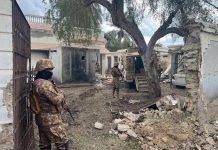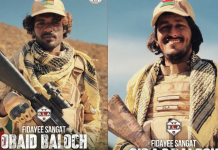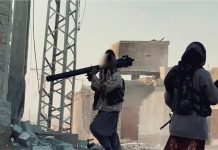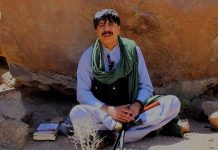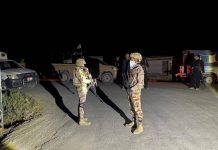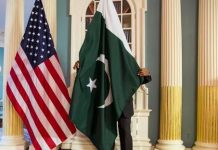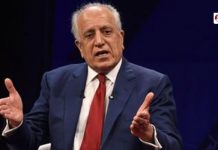Author: Jamal Baloch
I am not surprised that the educated class in Pakistan and Pakistani common people lack a proper understanding of the Baloch nationalist movement; how and why it emerged, the ideas it propagates and its main demands. In the past few days, the martyrdom of Shahdad Baloch and Ehsan Baloch, Quaid-i-Azam University (QAU) graduates who later joined the Baloch Liberation Army (BLA), has sparked a debate over the reasons that lead such bright and educated youngsters towards violence and encourage affiliation with organizations that are already declared as “terrorist organizations”. They argue that such educated young men of Balochistan become militants and joined insurgent groups as a reaction to the injustices and discrimination they face. These claims have given the impression that perhaps martyrs Shahdad and Ehsan are the first Baloch university graduates to join a militant organization, which is completely untrue. Thus, I want to address these misconceptions regarding the Baloch nationalist movement, especially concerning the reasons that have led educated Baloch take part in armed insurgency.
You are not blamed for your misconceptions about Baloch nationalism because the Baloch people have always been introduced to you as “uncivilised” and “ignorant” people. They have been introduced to you as people who have no interest in education and civilisation. In Sociology of Pakistan, Abdul Hameed Taga and Abdul Aziz Taga describe the Baloch people as “uncivilised people” who “lived in the desert and looted caravans”. Even though this book itself has received a lot of criticism, it is undeniable that the majority of Pakistani common people have this very same conception about the Baloch people. In another instance, the book says that the Baloch people often “fight with one another”. That’s why the only time you will see a Baloch’s news in Pakistani media would either be when declared as a terrorist for affiliation with an insurgent group or when a Baloch has killed another Baloch. Even such news would be presented superficially just to feed you with misconceptions you have been told and consolidate wrong impressions about the Baloch people and Balochistan. Thus, it is probably due to these misconceptions that the martyrdom of Shahdad and Ehsan Baloch, as former QAU students, was shocking, mainly to the Pakistani educated class.
But the reality of the Baloch youth and Baloch nationalism is significantly different from these erroneous impressions. In fact, the first person associated with Baloch nationalism and armed insurgency is Agha Abdul Karim who was a highly educated person and served as the governor of Kalat. In 1948, he officially proposed a separatist movement against Pakistan and embarked upon an armed struggle for the freedom of Balochistan. He also was one of the first Balochs to contribute to the resistance literature. Thus, it can’t be said that he became a freedom fighter as a mere reaction to his circumstances; rather, he was firmly convinced that Balochistan was under Pakistani occupation and fought for Balochistan’s freedom on firm educational and organizational foundations. From Agha Abdul Karim, probably the first Baloch freedom fighter, to the recently martyred Shahdad and Ehsan, the majority of the freedom fighters of Balochistan and Baloch nationalists are highly qualified and educated people.
Dr Allah Nazar, an MBBS doctor and a gold medallist, is the current head of the Balochistan Liberation Front (BLF), a pro-independence militant group. In a press conference, the renowned journalist Hamid Mir once stated that Dr Allah Nazar’s affiliation with BLF and armed insurgency was a result of the physical and mental torture he went through during the time of his arrest. Mir emphasised that Dr Allah Nazar’s aggression and antagonism towards Pakistan was a mere reaction to the way he was tortured. However, this is not the case. The educated class and the youth of Balochistan’s resistance against Pakistan is due to their realisation that Balochistan has and will always be subject to exploitation, abuse, poverty and neglect as long as Balochistan is under Pakistani occupation. The Baloch nationalist struggle resulted from the consciousness that Balochistan is colonized and the Baloch people are enslaved by Pakistan, and undeniably the Pakistani behaviour towards Balochistan has always suggested this. Baloch nationalism, whether through political struggle or armed struggle, has never been a reaction to the neglect of Balochistan as Pakistani province; rather, it rose form the realisation that Balochistan is a Pakistani colony, and independence from Pakistan is the only way to emancipate the Baloch nation and establish and protect their rights on their own land and resources.
Probably the strongest link between the educated youth of Balochistan and Baloch nationalism can be seen through the Baloch Students Organization (BSO) whose thousands of students were abducted and killed or are still missing. Zahid Kurd was the chairman of the organization and was a student of IR in Karachi University. Zakir Majeed, missing since 2009, was a student of Masters in English. Martyr Raza Jahangeer, the general secretary of BSO-Azad, did his Masters in Balochistan University.
Other leading Baloch nationalist figures include: Nawab Akbar Bugti, needs no introduction, received his early education from Karachi Grammar School and later from Aitchison College in Lahore and attended Oxford University in England. Nawab Khair Bakhsh Marri, who was a Baloch politician, received his early education in Kohlu and higher education from Aitchison College, Lahore. Abdul Nabi Bangulzai, with an engineering degree, is a senior commander of United Baloch Army. Dr Deen Muhammad, who is missing for more than a decade, is an MBBS doctor. Raheem Baloch, a leading figure of Baloch freedom movement, has an MA degree in LLB. Martyr Qumber Chakar was an MBA degree holder from BUITEMS in Quetta. Wahid Qumber Baloch, a BLF commander, did his master’s in mass media. Martyr Dr Khalid, another BLF commander, was an MBBS doctor. Martyr Zaman Marri was a lawyer, whereas, missing Dr Akbar Marri is a MBBS doctors. Ghulam Muhammed Baloch, the founder of Baloch National Movement (BNM), did his MA in Karachi University. Martyr Dr Mannan Baloch, the general secretary of BNM, was also an MBBS doctor. Martyr Balach Marri, ex commander and chief of BLA, studied Journalism in Russia. Martyr Qumber Qazi, once was the commander of BLF, was an MBBS doctor. Basheer Zeb Baloch, commander and chief of BLA, did his MA in Balochistan University. Shaheed Fida Baloch, a leading figure in the Baloch freedom movement, did his double MA, in economics, and in English, and received certification from Balochistan University in Balochi and Brahvi languages, Mir Muhammad Ali Talpur a Baloch writer and rights activist did his BA and then MA (Prev) in Journalism.
Both peaceful organizations like BSO and armed groups have identified Balochistan as a colony and the Baloch people under the curse of slavery. While their activism and struggle for an independent Balochistan took different forms, their agenda has been the same, which is Balochistan’s freedom. In addition, nearly every Baloch nationalist has a university degree and they are all well-educated and knowledgeable. Another impression that has always been prevalent about the Balochistan’s war of independence and Baloch nationalism is that these nationalists are proxies or agents of Pakistan’s enemies that have exploited their ignorance and have brainwashed them. However, it is implausible to think that an entire nation can be brainwashed to be a proxy or an agent. The above-mentioned martyrs and nationalists are only the few who are the leading figures and have publicly supported the movement and are the ones we are familiar with. There are thousands who are equally educated and knowledgeable and have been abducted and killed in their support of Baloch nationalism and those who are missing or fighting under the radar. Therefore, it would be completely naive and wrong to consider the Baloch nationalist movement as simply a reaction to the alienation and neglect encountered by the Baloch youth in universities as it has been suggested by the debates following the martyrdom of Shahdad Baloch and Ehsaan Baloch.
Balochistan and the Baloch nationalism should not be seen through the lens of Pakistani media or Pakistani textbooks. Obviously, it is very unlikely that the army-controlled media would present Balochistan to you in a neutral, truthful manner without any distortion. Because the Baloch nationalist movement is a movement against colonialism, against military control of the Baloch people, the best source to look for is the Baloch people themselves. Unquestionably not every Baloch supports armed insurgency; similarly, not every Baloch believes in political struggle. However, freedom of Balochistan and its liberty from all forms of colonialists and imperial powers is definitely an agenda that unites all Baloch people, including the educated and the uneducated. Shahdad and Ehsan Baloch were both supporters of this agenda; maybe the discrimination and injustice they faced consolidated their faith in their agenda, but it definitely was not the main reason for their affiliation with BLA and armed insurgency. Thousands of Baloch students, thousands from the educated class in Balochistan have been killed and many are missing. The martyrdom of Shahdad and Ehsan was not unique of its kind.
Pakistani military, through its powerful media activities, have been feeding the Pakistani people with lies and misconceptions about Baloch nationalism; depicting both the Baloch nation and Baloch nationalist as traitors, uncivilised, ignorant and violent. Thus, the people of Pakistan have believed this and, therefore, the martyrdom of Shahdad and Ehsan came as a shock to many Pakistanis because they have personally seen these two bright minds and have known, not through the lens of the media, but through their characters and values. Shahdad and Ehsan and their love for education, humanity and freedom represent an entire nation that you have been taught to hate and despise.
Disclaimer: The views and opinions expressed in this article are those of the author and do not necessarily reflect the official policy or position of The Balochistan Post or any of its editors.











